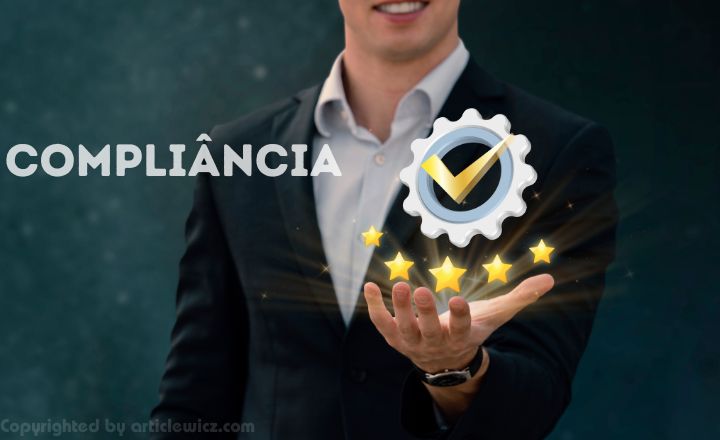The Business Landscape: Navigating the World of Compliância

In today’s speedy-paced international, the idea of enterprise has evolved right into a complex atmosphere that demands adherence to rules and standards. One such crucial factor is compliância which refers back to the compliance practices that groups have to comply with to ensure they are working within prison and moral limitations. In this text, we can discover the significance of compliância in enterprise and how it influences the general public.
- Understanding Compliância
- The Importance of Compliância
- Benefits of Compliância for Business
- Key Elements of Compliance
- Implementing Compliance
- The Role of Technology in Compliance
- Best Practices for Compliância
- Compliance Challenges
- Compliância and Consumer Trust
- Future Trends in Compliância
- Conclusion
- FAQs about Compliância
Understanding Compliância

Compliância, or compliance, in business is the practice of following legal guidelines, rules, and ethical suggestions set by means of government. It encompasses numerous areas consisting of financial, environmental, and facts safety policies. Compliance is essential for companies to function ethically and keep away from prison issues. It allows build accept as true with with customers and stakeholders and guarantees the agency’s long-term fulfillment.
The Importance of Compliância
Compliance, or compliância, is essential for organizations to function inside the regulation and uphold moral requirements. It’s approximately following rules and guidelines set by means of authorities. Compliance builds agree with with clients, investors, and regulators. It also allows corporations keep away from criminal issues and financial penalties.
Benefits of Compliância for Business
Legal and Regulatory Compliance
Businesses need to apprehend and comply with the rules and regulations that apply to their industry and area. It’s crucial to perceive and meet all criminal requirements and make sure that each one approaches and moves align with those regulations. Regular audits and tests are important to make sure the whole thing is so as and to address any issues directly.
Increased performance
Improving efficiency is vital for organizations to remain competitive and profitable. It involves streamlining approaches, reducing waste, and maximizing productivity. By figuring out inefficiencies and implementing modifications, groups can store time and assets, in the long run main to increased profitability and growth.
Risk Management
Compliance is critical for managing dangers correctly. By complying with regulations and standards, companies can discover and mitigate capability dangers, which include legal problems, economic penalties, and reputational harm.
Enhanced Reputation
Building a sturdy reputation is important for groups to draw customers and investors. It includes constantly delivering first-rate services or products, being obvious and ethical in commercial enterprise practices, and actively enticing with customers and the network. An advantageous recognition can lead to extended purchaser loyalty, progressed brand perception, and ultimately, greater fulfillment for the business.
Continuous Improvement
Compliance is not something you do once and forget about; it is an ongoing technique that calls for constant interest and adjustment to new challenges. That’s why businesses must often assessment and replace their compliance programs to live in advance of new risks, adjustments in rules, and shifts in commercial enterprise desires. This consists of investing in team of workers education and education to hold them knowledgeable and compliant. By addressing these key elements of compliance, corporations can construct a robust basis for integrity, reduce dangers, and build agree with with stakeholders.
Data Privacy and Security
As privacy and protection troubles emerge as greater prevalent, it’s crucial for companies to take steps to protect the personal information of their employees and clients. Compliance includes adhering to policies regarding the collection, dealing with, disclosure, and protection of private records. To efficiently deal with records privacy and safety threats, agencies want to live informed approximately evolving necessities and put into effect strong answers.
Key Elements of Compliance
- Understanding Regulations: Businesses must have a radical knowledge of the relevant legal guidelines and regulations that follow to their enterprise and place.
- Policy Development: Developing and imposing rules and methods that align with felony necessities and moral standards.
- Training and Education: Providing ongoing education and schooling to personnel to make sure they’re privy to compliance requirements and the way to adhere to them.
- Monitoring and Auditing: Regularly tracking and auditing compliance efforts to identify areas for development and make certain ongoing adherence to policies.
Also Read : How to Find Right Openhouseperth.net Lawyer
Implementing Compliance
Creating a Compliance Program
Organizations need to set up a formal compliance program that consists of policies, strategies, and controls to ensure compliance with relevant legal guidelines and guidelines. This application have to be tailored to the company’s size, enterprise, and precise compliance needs.
Providing Training
Regularly hold education sessions to teach operational groups and staff approximately regulations, expectancies, and compliance troubles. Embedding compliance into the organizational lifestyle calls for customizing schooling programs to meet the unique wishes of different departments and capabilities in the corporation.
Role of Leadership
Leadership performs a important function in selling a tradition of compliance within an agency. Executives and managers have to lead by means of example and prioritize moral conduct and compliance of their decision-making.
Employee Involvement
Employees at all tiers need to be worried in compliance efforts. They need to receive training, apprehend the significance of compliance, and experience empowered to raise concerns or report capacity violations.
Developing Policies and Procedures
Create clean suggestions for all employees, outlining the moves and behavior expected of them consistent with set up standards and guidelines. These policies and strategies have to give an explanation for what employees want to do to live compliant and preserve consistent operations.
The Role of Technology in Compliance
Technology performs a pivotal role in contemporary compliance efforts, providing quite a number benefits that beautify efficiency and effectiveness:
Automation: Technology automates guide tasks, decreasing errors and making sure consistency in compliance procedures. This includes automating statistics series, evaluation, and reporting.
Data Analysis: Advanced analytics equipment enable businesses to analyze massive volumes of records fast and as it should be. This allows discover patterns, trends, and anomalies that may suggest compliance problems.
Compliance control software program: allows corporations streamline and automate compliance techniques. It includes capabilities like report management, education, audits, and reporting, enhancing performance and making sure regulatory compliance.
Best Practices for Compliância
Risk Assessment
Conduct everyday threat assessments to perceive and mitigate compliance dangers. This enables prioritize compliance efforts and resources.
Regular Audits
Regular audits and evaluations are crucial for ensuring compliance with laws, guidelines, and inner guidelines. They assist identify regions of non-compliance and provide an possibility to put into effect corrective movements.
Case Studies in Compliância
- Company A: By enforcing a complete compliance application, Company A became able to avoid highly-priced prison consequences and enhance its recognition.
- Company B: Failure to conform with data safety rules led to a prime statistics breach, main to sizeable monetary losses and harm to its recognition.
Compliance Challenges
Complexity of Regulations
The continuously evolving and complicated nature of policies throughout industries and geographies pose demanding situations for groups to interpret, put in force, and observe them correctly.
Data Privacy and Security
With the increasing extent and sensitivity of facts, corporations face challenges in ensuring compliance with stringent statistics safety rules like GDPR and CCPA, which require strong measures to guard non-public statistics.
Globalization
Globalization poses a challenge for corporations working in multiple international locations. They must contend with varying policies and cultural norms, making it tough to make certain compliance across distinctive areas. This complexity can cause extra prices and administrative burdens as businesses attempt to fulfill various compliance requiremen
Resource Constraints
Limited finances, information, and workforce can preclude businesses’ capability to put in force comprehensive compliance applications. This can go away them susceptible to compliance dangers, as they’ll battle to preserve up with regulatory modifications and put money into essential assets.
Third-Party Risk
Managing compliance among third-party providers and companions adds complexity, as businesses have to make certain their compliance and mitigate dangers related to their sports.
Compliância and Consumer Trust
Compliance is crucial for building and preserving client trust. When corporations comply with laws, policies, and moral standards, they display their commitment to transparency and integrity. This, in turn, facilitates consumers sense extra confident and secure of their interactions with the enterprise. Compliance also allows prevent issues such as facts breaches and unethical practices, which could harm customer consider. By prioritizing compliance, groups can beef up their relationships with clients and decorate their recognition inside the marketplace.
Future Trends in Compliância
Technology Integration
The future of compliance will probable see improved use of generation such as synthetic intelligence (AI), gadget learning, and facts analytics. These technologies may be used for extra advanced monitoring, analysis, and reporting of compliance activities.
Globalization
As groups keep to increase globally, compliance packages will want to adapt to address a much broader variety of regulations and requirements from one-of-a-kind international locations and regions.
AI and Machine Learning
In the destiny, compliance efforts will increasingly more depend upon AI and device gaining knowledge of era to enhance efficiency and effectiveness. These advanced algorithms can examine tremendous amounts of records to discover developments, styles, and anomalies that can impact compliance. By leveraging AI, organizations can automate compliance procedures, improve selection-making, and anticipate capability risks. This lets in for better identification and mitigation of non-compliance troubles, in the end strengthening compliance efforts.
Conclusion
Companies that operate ethically and professionally establish agree with with stakeholders via training responsible enterprise behaviors, with compliance as the cornerstone. Utilizing improvements in generation and integrating compliance into organizational subculture and operations permits groups to fulfill their criminal duties and uphold ethical standards. While compliance may be complex, a strong dedication to it guarantees that the organization continues its recognition and fosters sustainable growth.
Read More : Unlocking the Power of Asseturi a Comprehensive Guide
FAQs about Compliância
What is compliância?
Compliância refers to the set of regulations, techniques, and practices that groups undertake to make certain compliance with legal and regulatory requirements.
What is compliance and why is it critical for agencies?
Businesses need compliance because it helps uphold integrity, reduces risks, safeguards the emblem, and cultivates stakeholder agree with. This is finished by using ensuring that the company complies with all relevant laws, regulations, enterprise standards, and moral principles.
What are the demanding situations in compliância?
Challenges in compliância encompass the complexity of regulations, aid allocation, and cultural differences in international operations.
What are a few emerging tendencies shaping the destiny of Compliância?
Emerging tendencies consist of the extended use of AI and machine mastering in Compliância efforts, heightened enforcement and consequences for non-compliance, more global coordination of regulations, technological integration and version, and a focal point on moral conduct and company responsibility alongside regulatory compliance.
What are the results of non-compliance?
Non-compliance can bring about legal consequences, reputational damage, financial loss, operational disruption, lack of licenses or permits, and in severe cases, crook expenses.
What are some common demanding situations groups face in achieving compliance?
Difficulty in information and complying with policies in lots of jurisdictions, limited assets, speedy regulatory trade, complicated era, and other comparable troubles are not unusual. To conquer these limitations, one must take a proactive method and work tirelessly.
How can organizations ensure they’re compliant with applicable guidelines?
Businesses can make sure compliance with relevant guidelines through staying knowledgeable approximately laws, imposing policies and techniques, schooling employees, monitoring activities, in search of legal advice, the usage of era, and engaging with regulators.




